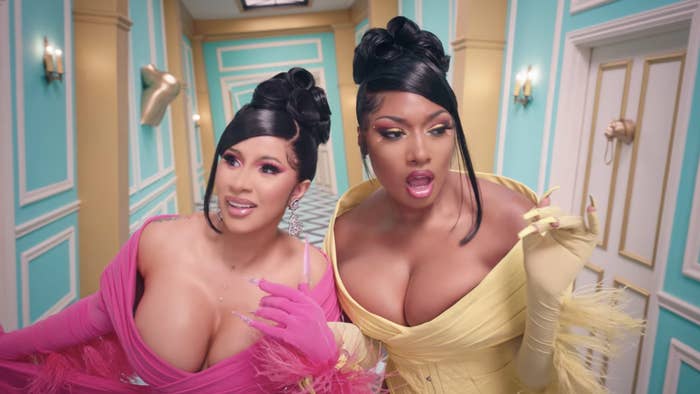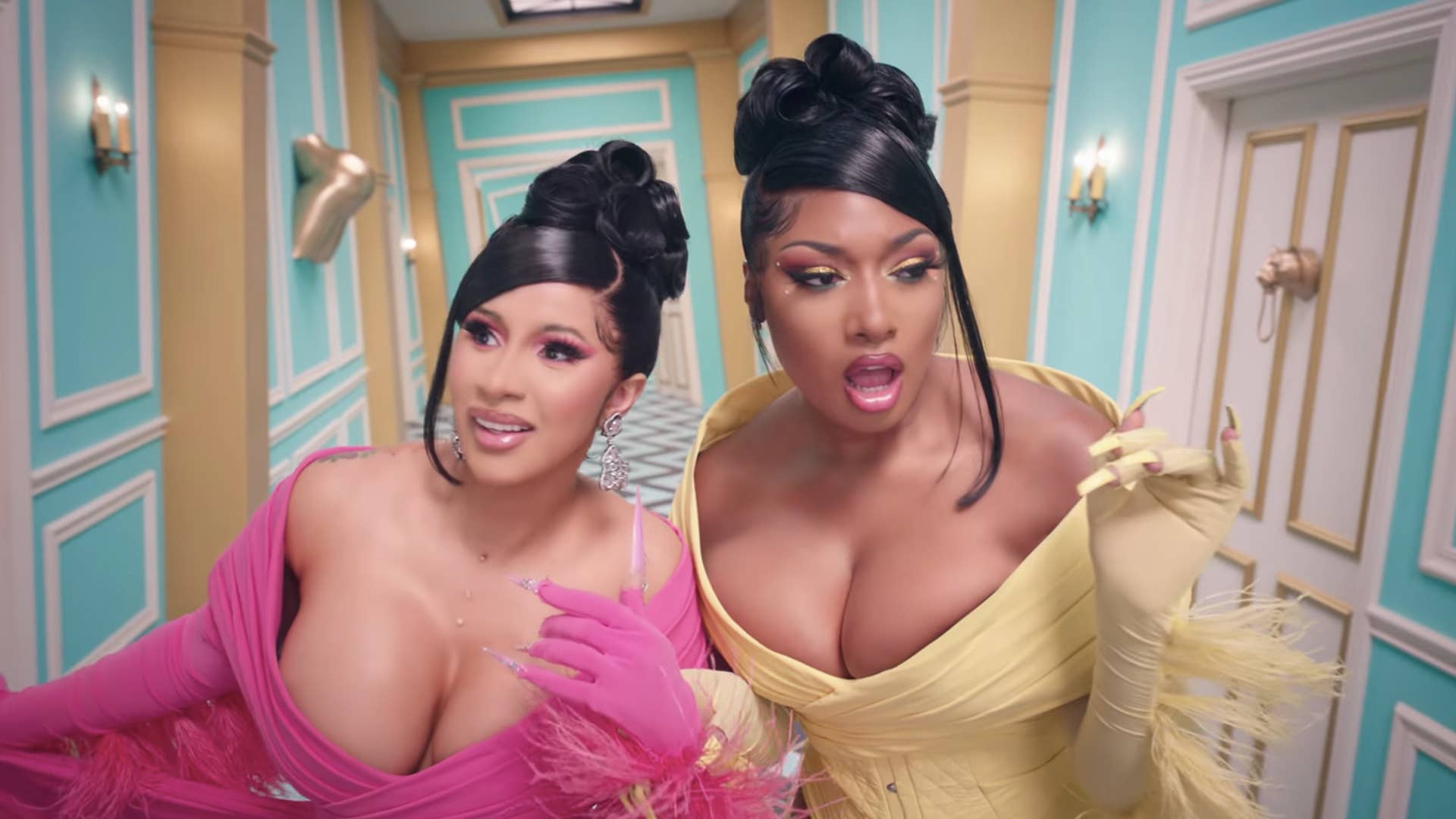
The funhouse of “WAP” features stone water fixtures that sprinkle water from their breasts. There are butt-shaped wall fixtures that bounce when you pass by. As Cardi B and Megan Thee Stallion prance around the mansion in glamorous one-pieces and matching updos, they quickly realize the house itself is charmed with magic, tigers, and cheetahs.
Demonstrating her sensuality, Cardi B sings, “I said certified freak, seven days a week/Wet-ass pussy, make that pullout game weak.” The rest of the video flashes back and forth between scenes of Cardi and Megan serenading each other in a snakepit, harmonizing in a fun room, and performing solo dances in their individual lairs, before they’re joined by other women who are unapologetically themselves. “WAP” is the epitome of female empowerment.
Both Cardi and Megan are powerhouses of female sexuality, independence, and dominance. In a male-dominated genre that is often criticized for misogynistic wordplay toward women, the two rappers have never shied away from taking back the narrative of femininity in hip-hop. And during a time when Black women have taken to social media to advocate for their protection and support, while basking in their blackness, the music video couldn’t be more timely.
The song’s intro is built around a sample from Frank Ski’s “There's Some Whores in This House,” effectively probing us for what’s to come in the video, where we’re taken on a tour through a mansion full of women who are demonstrative of their sexual prowess, with unmatched confidence. The house’s setup is homogeneous to Amsterdam’s Red Light District, where sex workers dance in front of windows to attract potential customers. Arduous dance moves and Olympic-worthy splits—requiring knees of steel and unparalleled flexibility—pay homage to the strip clubs where they originated. Gender stereotypes are dismantled in the very first verse, as Cardi sings, “I don't cook, I don't clean/But let me tell you how I got this ring,” creating no space for the stereotypical submissive, stay-at-home wife figure.
Walking in the footsteps of iconic sex-positive female rappers like Trina, Lil Kim, and Khia, Cardi and Megan splash around in a pool of water (which we can assume is symbolism for… yup) and describe in detail what a night in bed with them might be like. Through cocky, self-assured lyrics, the duo own their sexuality and shine light on other prominent sex symbols and female musicians, including Normani, Rosalía, Mulatto, Sukihana, Rubi Rose and Kylie Jenner.
“WAP” is the epitome of female empowerment.
The song and video were an immediate success. “WAP” debuted at No. 1 on US Spotify and No. 6 on Global Spotify with 2.34 million and 3.75 million streams, respectively. It also debuted at No. 1 on US Apple Music. The music video itself racked up over 26 million views in its first 24 hours on YouTube, making it the biggest debut for an all-female collaboration on the platform. And anyone who was on Twitter Friday knows “WAP” is all anyone could talk about.
Despite the overwhelming success of the song, though, it was also met with critique. Political candidates like US House candidate Angela Stanton King and former Congressional candidate DeAnna Lorraine felt the music video’s message promoted “aborted babies” and “organ harvesting” while setting “the entire female gender back by 100 years.” One politician, James P. Bradley, went so far to claim that “Cardi B & Megan Thee Stallion are what happens when children are raised without God and without a strong father figure,” an immensely controversial statement, especially given that Megan’s father passed away when she was 15.
These ludicrous critiques show, once again, that sex is only a taboo expression in music when women—specifically women of color—explore it. Love-making, sex, fucking, or whatever you might call it, isn’t a new theme in music. In fact, many of America’s “greatest hits” were tracks from Lynyrd Skynyrd, George Michael, Pearl Jam, and other male artists who explored sex and drugs in their lyrics. So why do we only hear criticism like this when artists like Cardi and Megan do it?
It’s common for women in music to fall victim to criticism when they create anything that is tied to their womanhood, and Black female artists in hip-hop are often degraded and hypersexualized for their freedom of expression. In a Harper’s Bazaar article about women in rap’s relationship with misogynoir, writer Taylor Crumpton says, “Misogyny is institutional oppression against women at large, but misogynoir is the dehumanization of Black women perpetuated through individual, societal, and cultural violence toward Black women.” While some might find the explicit nature of the “WAP” video to be off-putting and harmful to Black womanhood, the gag itself is that Black women have little to no control of how society views us, with or without Cardi and Megan’s collab. Adultification begins as early as our pre-teen years, stereotypes dated as far back as colonization are unavoidable, and fatphobia is highly ingrained in how society perceives Black woman bodies. Black women shaking their butts and describing their sex life in music is not what sets Black women back; it’s the people who justify harm toward us because of these actions.
Art like “WAP” could not be more valuable and necessary during a time when people are actively trying to unlearn their own biases and recognizing ways that they contribute to the neglect of Black women.
During the racial revolution that has erupted from the killings of Geroge Floyd, Breonna Taylor, and others, Black women have acted as trailblazers for advocacy and support for all sub-groups of the Black community. From the lack of compassion that Megan received after being shot to the few efforts from authoritative figures in the death of Oluwatoyin “Toyin” Salau, it’s become more apparent than ever that Black women are not afforded the same protection—or even allowed to exist the same way—as other women, simply because of the biased lens society views us through.
Critiquing “WAP” as degrading, dehumanizing art is a camouflage for critiquing Black womanhood as a problematic expression. When feminists of other backgrounds and races advocate for reproductive rights, the freedom of choice and expression, and reclaim their bodies, they’re viewed as progressive and passionate changemakers. Black women deserve to be viewed the same when they choose to display feminst expression through dance, vocality, and clothing. Whether demonstration exists through the form of a protest with signs that read “My body, my choice” or a colorful music video where Megan Thee Stallion is seen doing the splits in a tiger-print bodysuit, all women deserve to express their sexuality how they choose, without the criticism from others. The problem with critiquing two young women of color for singing about sex and performing dance moves that many of us wish we could mimic, is that the critique itself stems from deep-rooted, historical biases. These stereotypes leave Black women unprotected and rarely taken seriously, creating a dangerous narrative that support is not synonymous with a woman’s sexual desires.
Like the lyrical and visual content of “WAP,” femininity and womanhood have always been controversial topics, proving that society’s idea of how a woman should act, dress, and talk in order to receive respect and love is still quite conservative. Optimistically, along with the fight against police brutality, systemic racism, and facism, Black women are receiving heightened attention regarding their pleas. Art like “WAP” could not be more valuable and necessary during a time when people are actively trying to unlearn their own biases and recognizing ways that they contribute to the neglect of Black women. Their reaction to the video alone will quickly alert them of where their views stand.
“WAP” is a prime example of progressive womanhood and modern femininity. The theme of women prioritizing pleasure and joy runs from start to finish. Liberation and power are showcased in the lyrics, placing the track as the duos’ most forward and compelling expression yet. Also, the song slaps.


